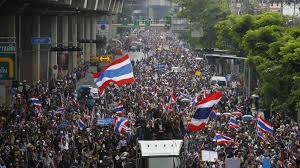 The Manila-based free expression advocacy group Center for International Law asked the UN Working Group on Arbitrary Detention Wednesday to press the Thai Royal Government to free a Thai poet and blogger being tried by a military tribunal for writing articles that allegedly insulted King Bhumibol Aduljadej.
The Manila-based free expression advocacy group Center for International Law asked the UN Working Group on Arbitrary Detention Wednesday to press the Thai Royal Government to free a Thai poet and blogger being tried by a military tribunal for writing articles that allegedly insulted King Bhumibol Aduljadej.
The cyberactivist, the poet Sirapop Korn-A-Rut, has been detained at the Bangkok Remand prison since June 2014 and faces up to 45 years in prison under his country’s restrictive lèse majesté laws, or laws penalizing any publication deemed offensive to the Thai King.
“Sirapop has written about a wide range of issues dealing with the contemporary political and legal climate in his country, a brave act that cannot be honestly done without dealing with the institution of the Office of the King of Thailand,” said lawyers Harry Roque and Romel Regalado Bagares, chair and executive director, respectively, of CenterLaw. “In doing so, he has run afoul of the lese-majesté laws of the Kingdom of Thailand, which he has also considered to be a long-standing instrument of political repression and oppression in his country.”
The Thai cyberactivist, whose situation was brought to Centerlaw’s attention by the Thai internet freedom group Internet Law Reform Dialogue (iLaw), is accused of publishing several allegedly libelous poems online against the Thai King sometime between November 7, 2009 and June 30, 2014 under the pseudonym “Rungsira.” One poem (Shut the news, closing the eyes, buffalos are tearful, because the tiger may die) Pid-khao-bod-khloa, Kra-bu-ram-hai, Duay-wa, Pa-yak-ka-jak- ka-wai, was posted on the web board of the“Prachathai” website (www.prachataiwebboard.com).
This carried a caricature of an crowned old man with a Swastika on his military uniform sleeve accompanied by the text “…being an angel, why does one have to walk on the soil, overlook the ground surface, even if having normal food every meal, being modest, because we are faithful, with two hands we build up ourselves…”
The same caricature with the text “Prince Baworndesh the head of the rebels, Din Tarab the army leader of the rebel, Sulayut Julanon the Grandson of the rebels, the Angel the King of the rebels, Suthep Thaugsuban the Southern rebel, Sondhi Limthongkul the Chinese rebel,” also appeared on his blog (http://rungsira.blogspot.com/2014/01/blog-post-22.hlml). All of these were purportedly placed and made available online by Sirapop during Martial Law in Thailand.
The human rights group Amnesty International reports that around 511 activists, students, academicians and journalists have been arrested and arbitrarily detained, in violation of their rights to freedom of expression and peaceful assembly, since Martial Law was declared in the country last May 20, 2014.
Authorities have used security legislations and lese-majesté laws to suppress even peaceful dissenters to such extents that enforced disappearances, torture and inhumane treatment were carried out, prosecutions of criminalized political activities were hastily made, media was bullied into silence and self-censorship, and human rights safety mechanisms were set aside.
In their 16-page petition to the Working Group, the Filipino lawyers said Sirapop is clearly being arbitrary held and tried simply because he has chosen to exercise his right to free expression and to participate in public affairs in his country, which rights are protected under international law, including the International Covenant on Civil and Political Rights, of which Thailand is a party. The Thai cyberactivist is also being denied his right to a fair trial, according to the petition.
The UNWAD is a specialized UN human rights mechanism dealing with urgent cases of arbitrary detention any where in the world. While its rulings are non-binding, these are considered authoritative on the state of international law dealing with fundamental human rights. Over the years, its interventions in the situation of many human rights activists in repressive states have yielded positive results.
Centerlaw cited a view issued by the UN Human Rights Committee in the case of jailed Filipino broadcast journalist Alexander Adonis, which Centerlaw had brought before the Committee. “In its view in the Adonis case the UNHRC said that criminal libel is incompatible with the freedom of expression protected under Art 19 of the ICCPR,” it said in its Petition filed on behalf of Sirapop.
Thailand’s ruling military junta has scrapped the country’s old Constitution and replaced it with an interim charter that denied the right of appeal to citizens convicted of violating its lese-majesté laws. As in Sirapop’s case, it has increasingly used military courts to prosecute alleged offenders without a public trial. Centerlaw argues that thailand’s military tribunals are not independent of the Executive and the lack of an appeal removes any possibility of a remedy against its judgments.
*image from http://www.stopmakingsense.org
